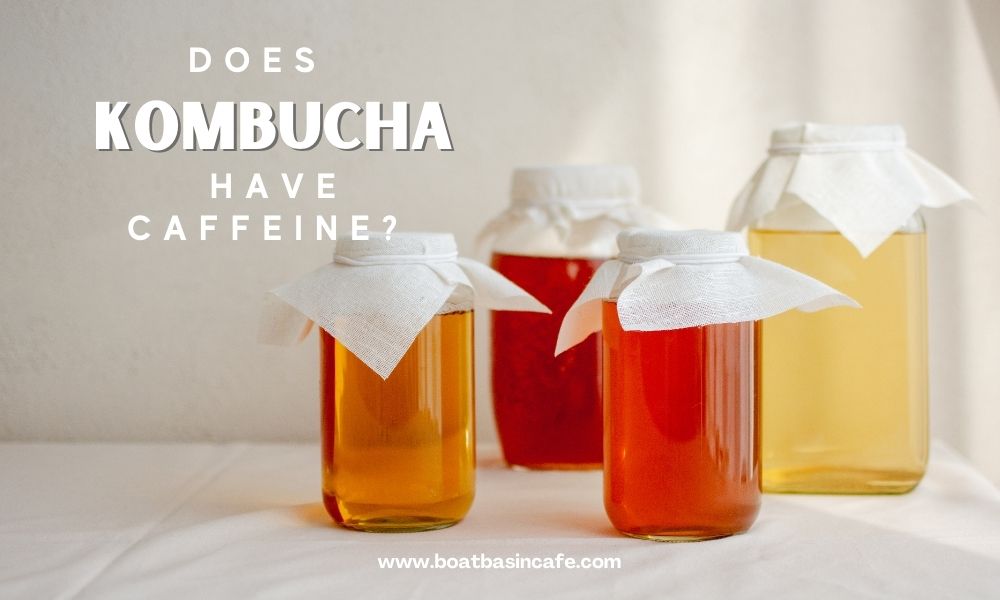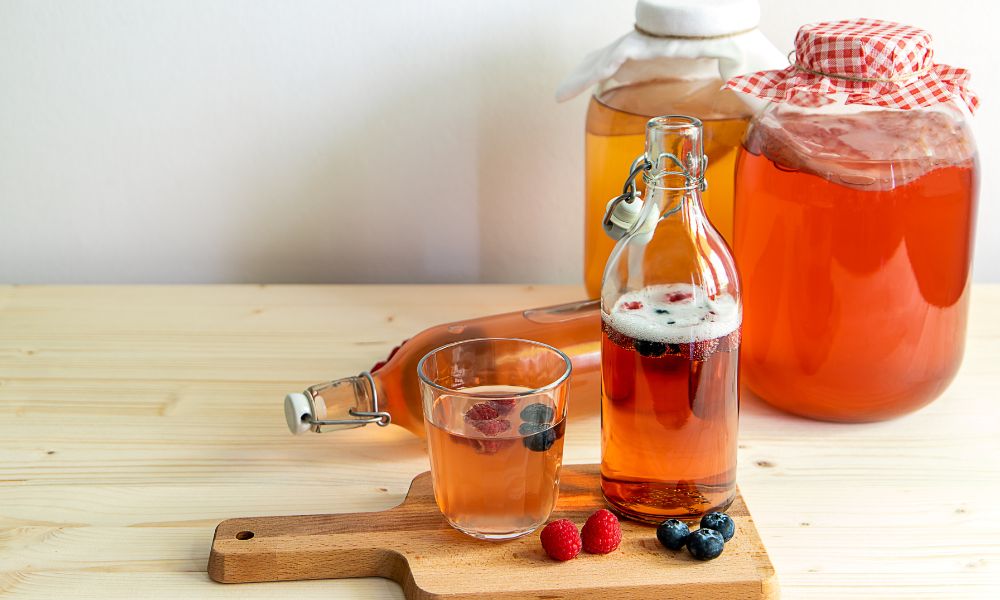Does kombucha have caffeine? Find out in our article today! We answer every question you’ve ever had about caffeine content with kombucha.

Caffeine content is a necessity for some – and something to avoid for others. So, you want to know how much caffeine each drink has.
So, if you’re here to find out how much caffeine kombucha has – or if it even has caffeine in the first place – you’re in the right place! Caffeine can be detrimental to your health, so let’s begin:
What is Kombucha?
Kombucha is a type of sweetened black tea drink that has undergone a fermentation process. This fermentation process includes sugar, tea leaves, and yeast. As the beverage is being fermented, kombucha contains and releases bacterial and fungal compositions, along with acid and some alcohol.
It is sometimes referred to as kombucha tea to distinguish it from bacteria and yeast cultures. Normally, juices and spices are also added when brewing kombucha, resulting in different flavors. Normally, it tastes a lot like apple cider vinegar.
Aside from acids and alcohol, it contains caffeine as well.
Does Kombucha Have Caffeine?
If you’re watching your caffeine consumption or caffeine intake, we’re sorry to tell you that most kombucha does have caffeine levels in them! The caffeine is naturally occurring due to the tea leaves used. Oolong, black, green, and white teas all contain caffeine.
Around 15 mg of caffeine is in a kombucha drink. It’s barely noticeable, so even if you’re watching your caffeine content, you can still drink kombucha! Kombucha contains more nutrients than caffeine, and the caffeine isn’t that much in comparison to other beverages.
How Much Caffeine is In Kombucha?
It has around 15 mg of caffeine content per serving. During the kombucha tea fermentation process naturally reduces the amount of caffeine in each serving. If you’re wondering how much caffeine is in your own kombucha, you can have a benchmark depending on how long the brewing process is.
The longer the brewing process, the more caffeine is eaten up by yeast and bacteria.
How to Make Kombucha

What You May Need:
Making kombucha starts water, a cup of sugar, 8 bags of your chosen tea (either black or green tea works best!), 2 cups of starter tea, and 1 scoby per fermentation jar. For more flavor, you might also need fruit juice, chopped fruit, flavored tea, honey, and some herbs and spices.
If you prefer to watch over your caffeine content, you can look for a tea bag that’s decaffeinated. Less caffeine is good for you, too!
Step 1: Brew the Base
Heat water until boiling before stirring in sugar. Add tea bags and let steep for a few hours until the tea and water mixture has cooled.
Step 2: Add Starter Tea
Remove the bags from the water. Stir in the starter tea. Don’t forget this step – it helps stop harmful tea fungus and bacteria from forming as it makes the hot liquid acidic.
Step 3: Add the Scoby
Transfer your liquid into jars and add scoby into each jar. Cover the mouth of the jar to make sure that no insects get in!
Step 4: Ferment
Ferment multiple kombucha jars out of sunlight. Keep it in an undisturbed, cool, dry place for seven to ten days. There are several microbial and biochemical dynamics going on! You might notice new scoby forming, or sediments and bubbles forming as well. The yeast will eat the sugars and create carbon dioxide.
Don’t worry – these are just signs of microbial fermentation, and the living cultures that exist in kombucha!
The fermentation process allows for kombucha nutritional compounds to form, too. It contains these nutrients that you benefit from!
Keep tasting the beverage until it reaches a flavor you like in your typical cup.
Step 5: Remove the Scoby
Lift and remove the scoby out of the fermented tea. You can now proceed to bottling your beverage! Then, carbonate and refrigerate it according to the exact amount of kombucha you want.
Can You Brew Kombucha With Decaffeinated Teas?
Want less caffeine? We’ve got you. Just like there’s such a thing as decaf coffee, there are also decaffeinated teas. Instead of the usual caffeine you find in most teas, decaf tea provides you a safer way to have kombucha without worrying about caffeine content.
Which is Healthier: Coffee or Kombucha?
The amount of caffeine is much higher in coffee compared to kombucha, but it’s not just the amount of caffeine that’s different. The health benefits differ, too.
If you want something healthier for the same amount of beverage you have each day, kombucha is much healthier for your gut and overall well-being! Green tea is also a healthier alternative in comparison to coffee. If you want caffeine, consider going for black tea.
What Are Some Healthy Kombucha Brands?
The Health-Ade Kombucha Tea, GT’s Kombucha, Brew Dr. and Better Booch Kombucha Organic are some bottle labels you should look out for! If you’re looking to ditch coffee or caffeine, Brew Dr., Health-Ade, GT’s, and Better Booch are the best for you!
FAQs
What is kombucha good for?
Kombucha has a number of health benefits, and it’s good for you if you want a healthy gut! It can improve digestion, mental task performance, and helps manage diseases such as cancer, heart disease, and diabetes.
Who should not be drinking kombucha?
Some forms of kombucha have caffeine and alcohol. Due to the drink being unpasteurized, it’s best if kombucha is limited from pregnant people and anyone breastfeeding. Should kombucha result in an allergic reaction, liver complications, or acidosis, you should also stop kombucha right away!
Is it healthy to have kombucha daily?
Yes, you can drink kombucha everyday. Due to its probiotic-rich formula, it helps in digestion and is a healthy dose to drink everyday.